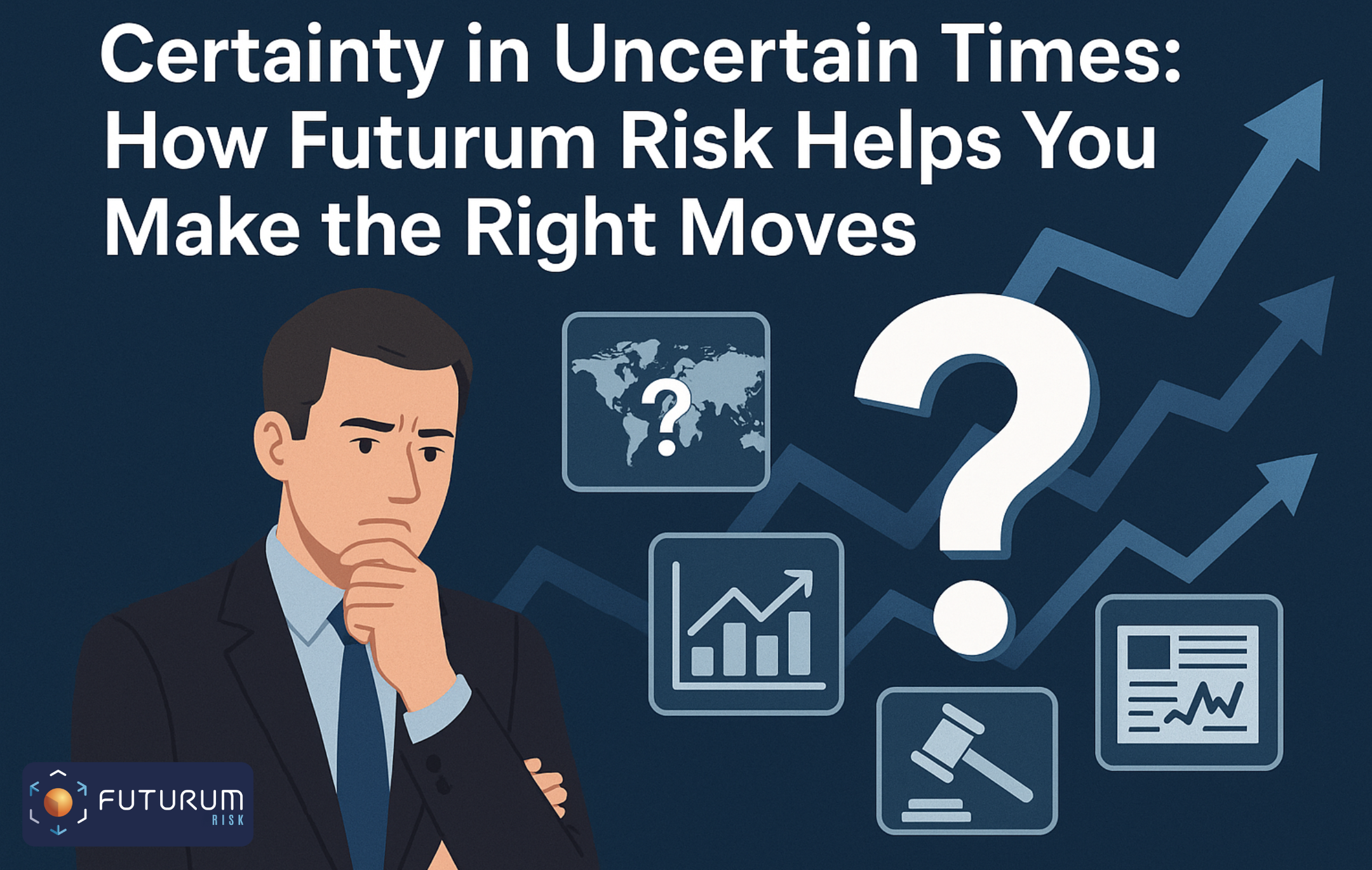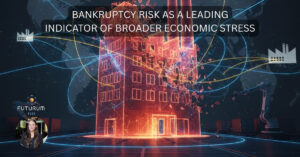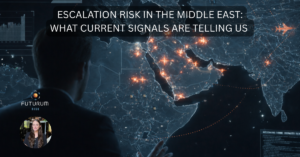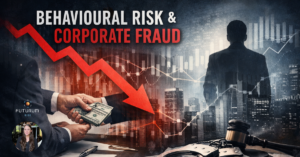Certainty in Uncertain Times: How Futurum Risk Helps You Make the Right Moves
You’re planning a move. Or perhaps you’re preparing to make a major investment. But everything around you feels unstable. Political climates are shifting, borders are tightening, and new technologies are being used in ways that many don’t fully understand yet. From social media checks in visa applications to sudden sanctions impacting financial flows, uncertainty isn’t just a headline; it’s something people are personally running into more often than they expect.
If you’ve felt hesitant lately, you’re not overreacting. We are living through a moment in history where “the unknowns” are no longer theoretical; they’re real risks. And for professionals, investors, and globally mobile individuals, that uncertainty can mean financial loss, reputational damage, or missed opportunities.
At Futurum Risk, our work is grounded in one key idea: intelligence creates certainty. If you’re applying for a visa, vetting a business relationship, or planning a move into a new region, you need clarity, not vague advice or general assumptions. Our job is to uncover what others miss, highlight what could go wrong, and help you move forward with full visibility.
Let’s dig into the areas we’re seeing the most uncertainty, and what you can do about it.
Visa Uncertainty: What They’re Not Telling You
Visa applications used to be bureaucratic, but predictable. Today, with heightened scrutiny, visa applications have become more complex than ever, not because of paperwork, but because of the quiet but powerful role digital footprints now play in the review process.
Here’s the reality:
Since 2019, the U.S. has required most visa applicants to submit all social media handles used in the last five years. This data is cross-checked with national security databases, monitored by AI tools, and assessed by officers for anything that could be flagged as a potential threat or contradiction to your application narrative.
But most applicants don’t realise what qualifies as a red flag. It’s not just overtly criminal or extremist content. It can be:
- Jokes or memes that touch on sensitive political topics
- Retweets that signal certain ideological leanings
- Photos taken in countries under U.S. sanctions
- Posts that suggest you may intend to overstay your visa (e.g. calling a “holiday” a “move”)
- Online affiliations with controversial groups, even if you don’t interact with them
And here’s the difficult part: if your visa is denied because of this, you may never be told why. The decision is discretionary, and there is rarely transparency.
A Common Case We’ve Seen:
You posted a meme five years ago during a politically tense time. You barely remember it. But the algorithm parsing your online activity does. Now, you’re applying for a visa to attend a conference. Your application is rejected without explanation.
This happens more often than people realise. And with no official way to challenge digital content as “taken out of context,” the rejection can be permanent, with future applications viewed through the same lens.
At Futurum Risk, we offer pre-clearance risk scans for visa applicants. We conduct a comprehensive audit of your public digital presence, including legacy content, metadata, affiliations, and geotagging data. We assess it like an immigration officer might: What narratives could be inferred? What patterns emerge? What could be misunderstood?
We then prepare a mitigation strategy. In a system where thousands of applications are processed daily, subtle explanations often get lost. That’s why our focus is on minimising risk before the application is even submitted. We help clients reduce the likelihood of misinterpretation by identifying and removing problematic content, severing outdated affiliations, and aligning their digital presence with the expectations of today’s immigration systems, quietly and effectively.
Why This Matters More Than Ever
A March 2024 report from the Migration Policy Institute revealed that visa refusal rates have risen significantly in several major destinations since 2023. Digital activity is now cited as a contributing factor in an estimated one in five denials for applicants under the age of 45, with most applicants never learning what specifically triggered the refusal.
At a time when people are investing $50 000+ in relocation plans, international education, or global consulting opportunities, a preventable visa denial can derail years of planning. The earlier we intervene, the better your chances of success.
Legal & Reputational Exposure: The Risks You Don’t Know You Have
Uncertainty isn’t just about international borders, it’s also about your past, and how others might interpret it in the future.
We’re seeing a marked increase in due diligence failures, particularly in corporate and professional environments. Someone you once did business with, even incidentally, is now involved in litigation or financial misconduct. And because your name is still on old paperwork or in archived databases, you get pulled into a reputational mess.
Consider This:
You’re expanding your company into Europe. Everything appears compliant. But one of your co-founders from a now-defunct venture is implicated in a fraud case. That company never officially closed its books, and your name still appears on the shareholder register. When the case surfaces, your European partners find your name through a due diligence scan, and your credibility is immediately questioned.
This isn’t paranoia. With access to advanced databases, natural language processing tools, and AI-enabled search engines, stakeholders are able to unearth associations most people didn’t even realise existed.
Futurum Risk offers reputation mapping and legal risk audits to help you see yourself the way an investigator would. We examine databases in multiple jurisdictions, trace affiliations, and build a forward-looking risk assessment that answers the question: If someone looked into me tomorrow, what would they find?
This is especially relevant for founders, consultants, and high-net-worth individuals whose global exposure is only increasing.
Investing with Geopolitical Insight
You’ve got the capital. The opportunity looks promising. But something is holding you back.
In a global economy that is increasingly shaped by fast-moving geopolitical shifts, traditional investment due diligence simply isn’t enough. You don’t just need to know the financials. You need to know the context.
- Will a new sanctions regime affect the flow of funds?
- Is there pending legislation that could change property rights for foreign investors?
- Is the political climate moving toward nationalisation or market liberalisation?
- Are upcoming elections likely to cause volatility?
These are the questions we explore through our geopolitical intelligence reports. Unlike headline-based analysis, our reporting is designed to be decision-focused. We overlay economic, legal, and political dynamics to give you a view of what’s most likely to affect your specific investment, and what’s just noise.
For Example:
A South African investor is preparing to purchase real estate in a Latin American country currently considered “emerging but stable.” Our research identifies a proposed bill that would change the tax treatment of foreign ownership, effectively doubling capital gains tax within 12 months. The investor reconsiders, redirecting capital to a jurisdiction with more legal certainty.
It’s not always about pulling out. Sometimes it’s about timing the move or adjusting the structure. Either way, the goal is the same: avoid regret through foresight.
Uncertainty vs. Intelligence: The Power of Knowing
The most dangerous thing about uncertainty is that it feels manageable, until it isn’t.
Visa denials, reputational exposure, and bad investments often come as a surprise. But they rarely arrive without warning signs. The problem is, those signs are often buried in data, hidden in your own history, or embedded in systems you don’t have access to.
That’s why intelligence matters.
We’re not here to predict the future. We’re here to help you understand the landscape you’re walking into, so your choices are informed, your risks are measured, and your outcomes are no longer left to chance.
Building Certainty Before It’s Too Late
Across the board, global systems are becoming more integrated, more algorithm-driven, and far less forgiving of ambiguity. Immigration authorities now cross-reference visa applications with extensive digital ecosystems, not just social media, but data from third-party brokers, subscription services, travel records, and even marketing platforms.
2024 U.S. Department of Homeland Security procurement brief confirmed their increasing use of enriched data and AI tools to evaluate applicants based on behavioural patterns, affiliations, and inferred intent.
The result? A growing gap between what you know about your own exposure and what the system sees. And when decisions are made without transparency, certainty becomes a strategic asset, one that few people have, and fewer realise they need until it’s too late.
That’s why intelligence work isn’t just protective, it’s proactive. It helps you close the gap between perception and reality, giving you control over the narrative before someone else defines it for you. In a landscape this complex, certainty isn’t found by chance. It’s built deliberately, methodically, and early.
Futurum Risk exists to help you build that certainty. Before the systems make the decision for you.





